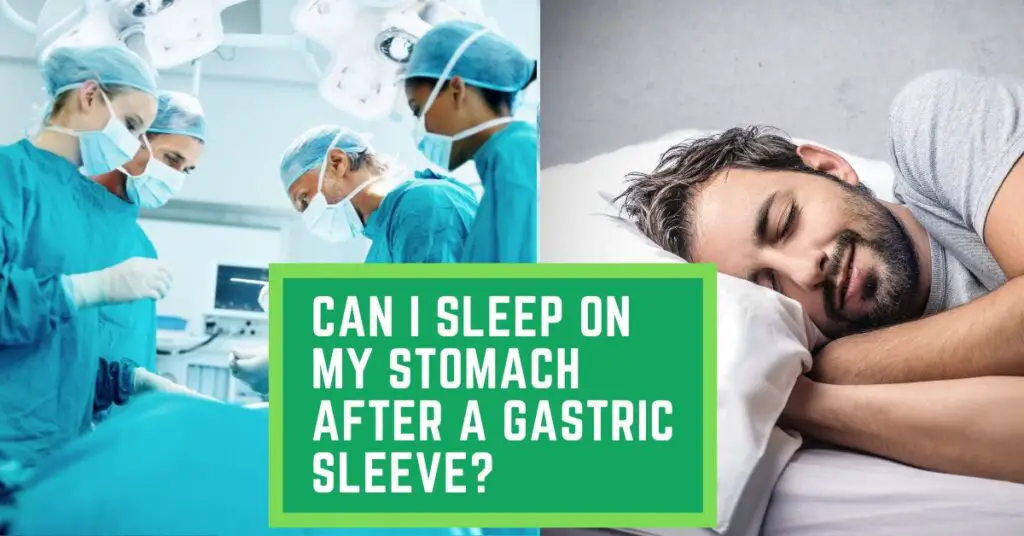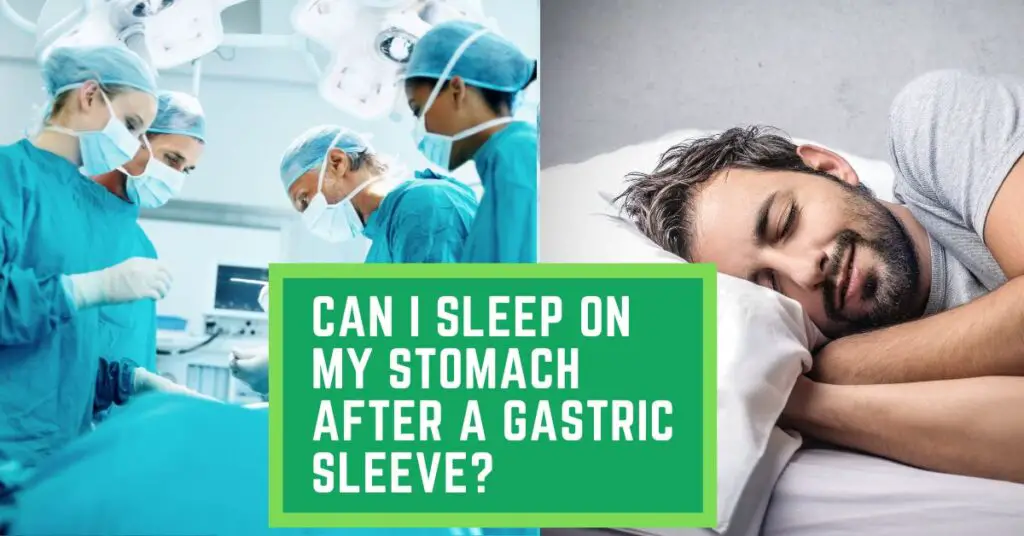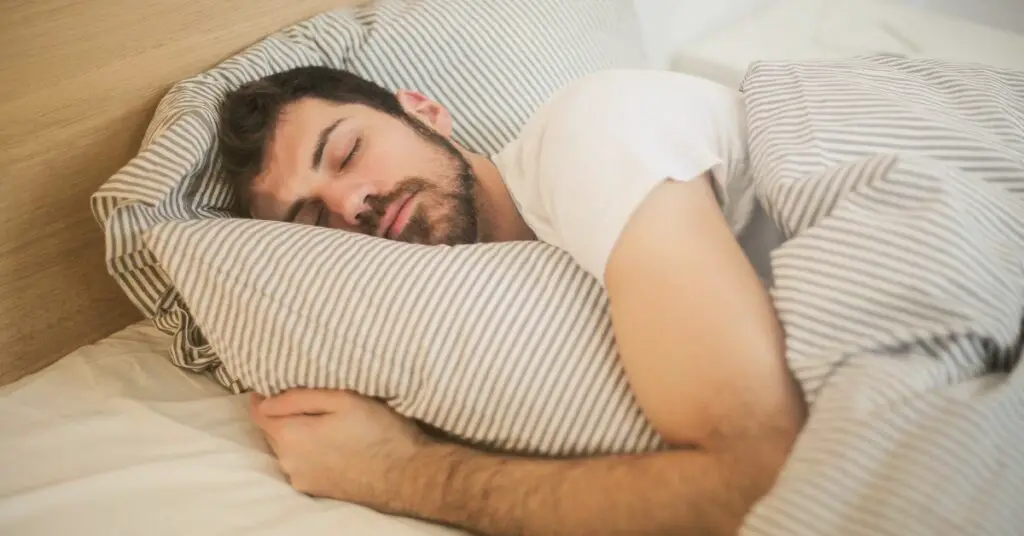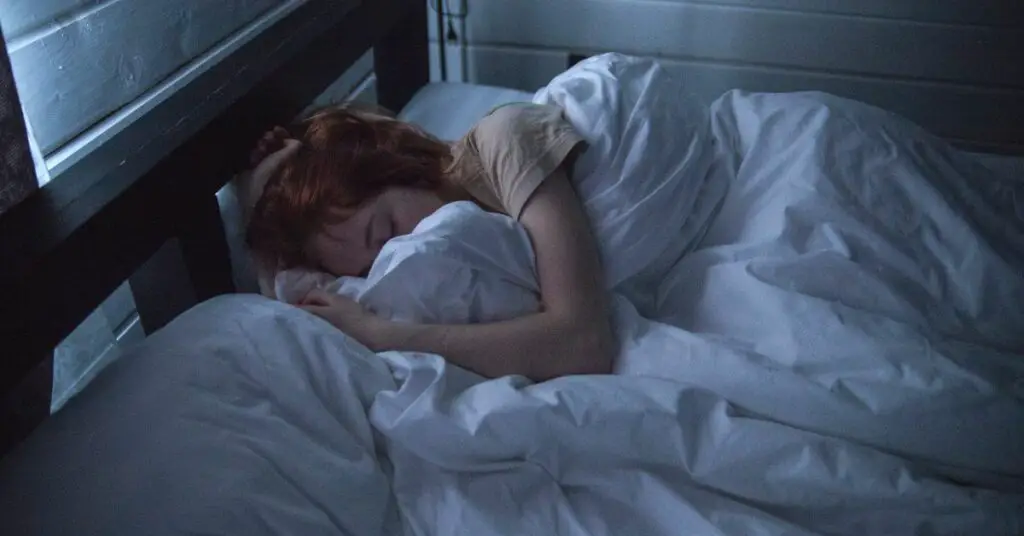Getting a good night’s sleep after gastric sleeve surgery can be difficult. This is because the surgery can cause pain and discomfort and disrupt your normal routine.
People have a common question about whether you can sleep on your stomach after a gastric sleeve.
The fact is that sleeping on your stomach after gastric sleeve surgery is not suggested because it can cause your stomach to protrude and apply pressure to your lungs.
In this article, we will discuss some tips for getting a good night’s sleep after gastric sleeve surgery and some things to avoid.
What is Gastric Sleeve Surgery?
Gastric sleeve surgery is a type of weight-loss surgery that involves removing a large portion of the stomach, leaving only a narrow sleeve of stomach tissue.
The surgery significantly reduces the stomach size, leading to reduced food intake and weight loss.
Gastric sleeve surgery is typically performed as a laparoscopic surgery, which is minimally invasive and involves smaller incisions than traditional open surgery.
Individuals who are considering gastric sleeve surgery should be at least 100 pounds overweight and have failed to lose weight through diet and exercise alone.
The decision to have gastric sleeve surgery is a very personal one, and it’s important to consult with a doctor or weight loss specialist to see if you are a good candidate for the surgery.
What to Expect After Gastric Sleeve Surgery?
After gastric sleeve surgery, you will likely experience some pain and discomfort.
This is normal and will subside as you heal. You may also experience some nausea and vomiting, which is also normal. Following your doctor’s instructions for managing pain and discomfort is important.
You will need to stay in the hospital for a few days after surgery so that your doctor can monitor your progress and ensure that you are healing properly. Most people are able to return to their normal activities within two weeks.
Getting a Good Night’s Sleep After Gastric Sleeve Surgery
There are a few things you can do to help ensure a good night’s sleep after gastric sleeve surgery:
1. Use pillows to support your back and head while sleeping. This will help relieve any pain or discomfort you may be experiencing.
2. Try to sleep on your side or in a semi-reclined position. This will help minimize the risk of stomach protrusion and pressure on your lungs.
3. Avoid eating late at night. Eating close to bedtime can cause indigestion and disrupt your sleep.
4. Avoid caffeine and alcohol before bedtime. Both substances can interfere with sleep.
5. Establish a regular sleep schedule and stick to it as much as possible. This will help regulate your body’s natural sleep cycle.
6. Practice relaxation techniques such as deep breathing or progressive muscle relaxation before bedtime. This can help ease any anxiety or stress you may be feeling, which can cause interference with sleep.
7. Create a comfortable sleeping environment. Make sure your bedroom is dark, quiet, and cool. Consider using a white noise machine to block out any unwanted noise.
The Danger of Sleeping on The Stomach After Gastric Sleeve Surgery
Sleeping on your stomach after gastric sleeve surgery can be dangerous because it can lead to irritation and ulceration of the staple line.
This is a common complication after gastric sleeve surgery and can often lead to additional surgery to correct the problem.
To avoid this complication, sleeping on your back or side is important after gastric sleeve surgery. If you cannot sleep in these positions, you may need to elevate your head and torso with pillows.
When Can You Sleep on Your Stomach After Gastric Sleeve Surgery?
Most patients can sleep on their stomachs starting about 6 weeks after surgery.
Before that, it’s important to keep your incisions clean and dry, so sleeping on your stomach may not be possible.
Some patients find that sleeping on their side is more comfortable during this time. If you have any concerns, be sure to talk to your surgeon or other members of your care team.
How Long Does a Stomach Take to Heal After a Gastric Sleeve?
Depending on how your body heals, it can take anywhere from four to six weeks.
Some people will experience minor discomfort and/or nausea in the first few days following surgery.
This is normal and usually resolves within a few days. You will be provided with pain medication to help manage any discomfort you may experience.
You will also be given a clear liquid diet to follow for the first week after surgery. Once you are tolerating liquids well, you will progress to soft foods, then regular foods.
It is important that you chew your food thoroughly and eat slowly to avoid causing yourself any discomfort.
How to Recover From Gastric Sleeve Surgery?
Recovery from gastric sleeve surgery is typically pretty straightforward. Most people feel good enough to go home within a day or two of surgery. There are some things you’ll need to do in order to ensure a smooth recovery:
– Follow your surgeon’s instructions closely regarding what foods to eat and what activities to avoid.
– Take all the medication prescribed, including painkillers and antibiotics.
– Drink plenty of fluids in order to stay hydrated.
– Expect some swelling and drainage from the incision site; this is normal.
– Get plenty of rest in the days following surgery.
– Expect some weight loss in the weeks following surgery as your stomach begins to shrink.
Frequently Asked Questions Related to Gastric Sleeve And Sleeping on Stomach
1. Can your stomach twist after gastric sleeve?
It’s possible for your stomach to twist after gastric sleeve surgery, but it’s rare.
The surgery can sometimes cause the stomach to twist, but this is usually remedied during the surgery.
In very rare cases, the stomach may twist again after surgery, but this can usually be fixed with another surgery. If you experience any pain or discomfort in your stomach after gastric sleeve surgery, contact your doctor immediately.
2. Why does my back hurt after gastric sleeve surgery?
Back pain is a common side effect of gastric sleeve surgery. The surgery can cause tension and stress on the back muscles, leading to pain.
Additionally, the weight loss that usually occurs after surgery can put additional strain on the back. Over time, most people’s backs adjust to the new weight and tension, and the pain goes away.
If you’re still experiencing back pain after gastric sleeve surgery, it’s important to talk to your doctor so they can determine the cause and provide you with appropriate treatments.
3. How do you get rid of belly fat after a gastric sleeve?
You can do a few different things to try to get rid of belly fat after a gastric sleeve.
A healthy diet and regular exercise are obviously key, but some supplements and other treatments may help.
Some people find that taking probiotics or green tea extract helps reduce belly fat, and others have had success with weight-loss supplements like Garcinia Cambogia.
A few surgical procedures can also be used to remove excess abdominal fat, such as liposuction or abdominoplasty. Talk to your doctor to see if any of these options might be right for you.













